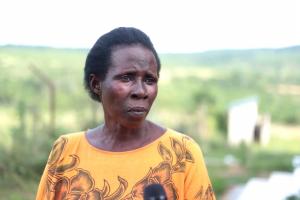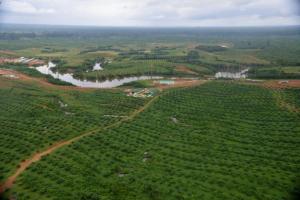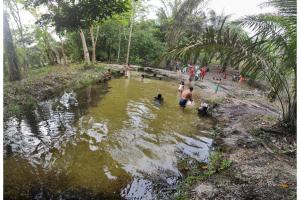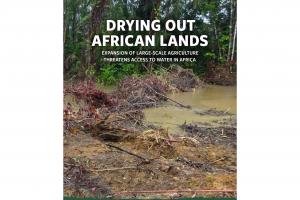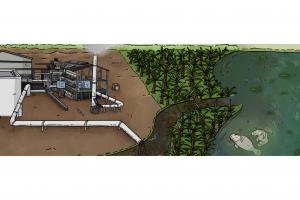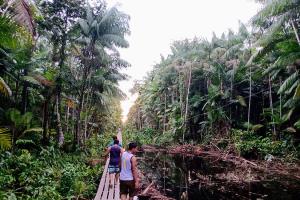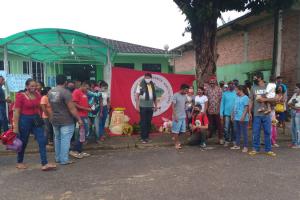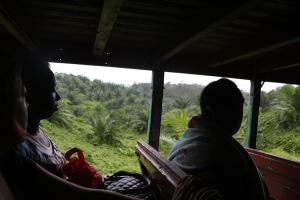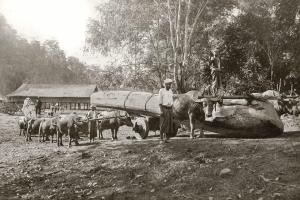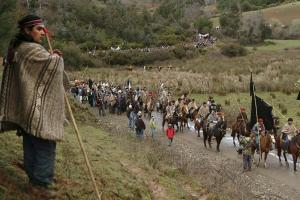Palm Oil
The oil palm tree is native to West Africa. It is an important tree for forest-dependent communities, their cultures and their economies. However, large-scale oil palm monocultures for industrial production (oil and agrofuels) have been driving deforestation and land grabbing in Southeast Asia. More recently, oil palm monocultures are also driving destruction in Africa and Latin America.
Multimedia
14 September 2022
In the Buvuma Islands, in Uganda, communities are resisting the expansion of industrial oil palm plantations.
Bulletin articles
12 September 2022
Industrial palm oil production in West and Central Africa is mainly controlled by five multinational corporations, and could continue expansion. Plantations take up large tracts of land. Land and water are interdependent. Yet, the current water crisis in these territories would not exist if corporations had not grabbed the land from communities.
Bulletin articles
12 September 2022
There is no other crop that has grown faster globally in the last decade than palm oil. This almost uncontrollable expansion leaves a deep trail of destruction and conflicts around its giant areas of plantations from Southeast Asia to West and Central Africa. As companies take over more community land, they also grab the water sources from them.
Other information
12 September 2022
A recent publication from the organization The Oakland Institute reviews 15 projects from agribusiness in 11 African countries, evidencing how the large loss of land has entailed a dramatic impact on communities’ access to water.
Other information
12 September 2022
An article in the news portal Mongabay exposes how six years after complaints were filed against the company Oro Rojo for polluting the rivers, wetlands and air, with its palm oil mill, nothing has changed.
Bulletin articles
16 June 2022
Fossil fuels are at the root of the climate chaos – but the conditions for this crisis have been created by the interconnections and dependencies between colonialism, racism, patriarchy and class exploitation. To address climate chaos, therefore, it is necessary to address the unequal relationships of power upon which a fossil-fuel dependent capitalism is based.
Bulletin articles
16 June 2022
In Brazil, oil palm plantations are expanding rapidly, mainly in the Amazonian state of Pará. BBF (Brasil BioFuels), the largest oil palm company in Brazil, stands accused of environmental crimes and violence against indigenous, quilombola and peasant communities such as Virgílio Serrão Sacramento, a community linked to the Small Farmers’ Movement (MPA).
Bulletin articles
16 June 2022
Communities resisting the impunity and impacts of oil palm growers in Ecuador: Cases from Esmeraldas
There are currently 270,000 hectares of oil palm plantations in Ecuador. The resistance processes of the communities of La Chiquita, Guadualito and Barranquilla de San Javier in the region of Esmeraldas continue to generate outrage and solidarity among other communities, and internationally.
Other information
16 June 2022
Bulletin articles
23 March 2022
The control of land was vital to colonisers. It meant wealth, territorial influence, access to ‘resources’ and cheap (and often enslaved) labour. The separation of indigenous inhabitants from their territories was a crucial component that persists until today. The effect of this history continues to influence the management of and conflicts over land.
Bulletin articles
23 March 2022
British firms not only controlled 80 per cent of the established ‘logging lands’ in Thailand, but they also influenced the establishment of the Royal Forest Department, which came to have total power over the nation’s forests. Massive land grabs and various colonial laws made half the country’s territory into a colony of the central state.
Bulletin articles
23 March 2022
What a certain historiography terms civilizational expansion or capital’s expansion has in fact been the invasion and de-territorialization of peoples and communities using much epistemic and territorial violence. Concessions have been granted in areas that are not demographic voids, a colonial concept that ignores the fact that they have been populated for millennia.
